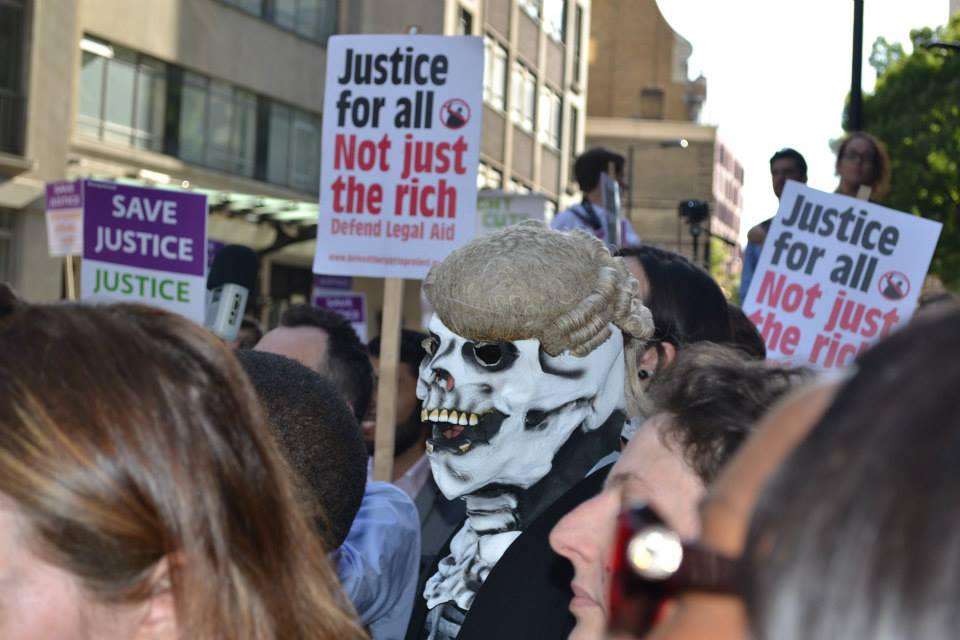 Becky presented to social services as homeless on the morning of her sixteenth birthday. She had been physically abused by her mother from the age of 11. Becky was burnt with an iron and her mother had slashed her across the face with keys. She had been diagnosed with multiple sclerosis (MS) at the age of 14 and, a year later, after learning that her father had passed away, felt she had no choice but to leave home.
Becky presented to social services as homeless on the morning of her sixteenth birthday. She had been physically abused by her mother from the age of 11. Becky was burnt with an iron and her mother had slashed her across the face with keys. She had been diagnosed with multiple sclerosis (MS) at the age of 14 and, a year later, after learning that her father had passed away, felt she had no choice but to leave home.
This article first appeared on openDemocracy here
Becky was informed that social services could not help and, when she refused to leave their office, was referred to the local council’s housing department. As a 16 year old presenting as homeless to social services, this treatment was unlawful.
Becky spent the next two months sofa-surfing, before being placed in accommodation through the council’s housing department. Throughout this process, Becky had acted alone and without the support of independent professionals. She only knew of the existence of social services because she had grown up watching Tracy Beaker, a children’s television series about a young girl living in care.
It was several months later, following a relapse in her condition, that a college welfare officer advised Becky to seek legal advice for the way in which she was being treated. With the help of a specialist community care solicitor, funded by legal aid, the local authority eventually accepted that Becky should be given full ‘looked after child’ status, under Section 20 of the Children Act 1989.
Legal aid in England and Wales was established in 1949. It provides assistance to people who would otherwise not be able to afford legal representation or access to the court system. It is a vital part of the British justice system, ensuring that everyone – however rich or poor – is treated equally before the law.
Without legal aid, vulnerable young people like Becky would not be able to challenge unfair or unlawful decisions by public bodies such as social services. But the legal aid system is under threat.
Introduced on 1 April 2013 with the aim of slashing £350m a year from the £2.2bn legal aid budget, the Legal Aid Sentencing and Punishment of Offenders Act (LASPO) brought about the most swingeing cuts to civil legal aid the system had seen since it was introduced after the Second World War. LASPO removed most social welfare, housing and immigration (non-asylum) cases from the scope of legal aid, as well as the majority of private family law cases, apart from where there is evidence of domestic violence, child abuse or abduction.
Before LASPO was implemented, the Ministry of Justice (MoJ) estimated that 75,000 children and young people (including 6,000 children under 18) would lose entitlement to legal aid each year as a result of the cuts.
But research conducted by Just for Kids Law for the Children’s Commissioner of England has shown that the government may have underestimated the impact of the cuts, with significant findings of children and young people being unable to resolve complex legal problems because of a lack of access to specialist advice.
Just for Kids Law’s research was based on interviews with 28 young people aged between 12 and 22, who were being supported by the charity. Most of the young people interviewed did notknow that legal aid existed, or that the problem they faced was a legal matter, capable of being resolved by recourse to a lawyer. The majority of interviewees attempted to resolve the issue they were facing on their own before they discovered, through chance encounters, that they may be able to access legal support.
Over half the interviewees had become homeless before they came into contact with support workers and other professionals who advised seeking legal help, with a number reporting not knowing that legal aid was available for non-criminal matters.
The report also found evidence of some local authorities taking advantage of young people’s lack of knowledge of their rights to avoid providing statutory services. In particular, young people faced with homelessness – or the prospect of continued abuse if they returned home – complained about the lack of response from local authorities when they requested support from social services without legal assistance.
In stark contrast was the behaviour and responsiveness of public bodies like social services, immigration authorities, schools and housing services when young people made requests to them with the help of a lawyer. “I think people took us a lot more seriously because they knew a solicitor was involved” says the mother of one young person.
Just for Kids Law’s research also uncovered the experiences of young people who had to act as litigants in person as a result of cuts to legal aid. The report found that being a litigant in person made it less likely a young person would be able to resolve their problem, and the experience had a deleterious impact on their wellbeing.
Fran, a victim of domestic violence, was forced to represent herself at a hearing in the Family court, as she was unable to gather the evidence necessary to be granted legal aid under the LASPO regime. Fran reported feeling unable to meaningfully engage with the proceedings and questioned whether there was any reason for her to even try. “The Judge asked me, do I have anything to say? But I’m not a barrister, what am I going to say? Even if I do say anything, you’re not gonna listen to me,” she says.
Following the hearing, Fran’s partner was awarded sole custody of their child – a decision which was eventually overturned when she obtained pro bono support from a barrister who negotiated shared custody of the child.
Article 3 of the UN Convention of the Rights of the Child (UNCRC), to which the UK is a signatory, states that in all actions concerning children, the best interests of the child shall be a primary consideration. The government has repeatedly stated its commitment to giving “due consideration to the UNCRC Articles when making new policy and legislation”. But the cuts to legal aid contained in LASPO mean that children cannot access legal support, and their views and experiences are not being considered by decision-makers.
When he announced his “comprehensive package of reform” for the legal aid system last year, the Lord Chancellor, Chris Grayling said that he believed it offered “value for the taxpayer, stability for the professions and access to justice for all.” But last week, Grayling’s colleague at the MoJ, Liberal Democrat justice minister Simon Hughes, called for an urgent review of the impact of legal aid changes on child rights.
Reflecting on her experience, Becky, now aged 17 and accommodated by the local authority in a placement that meets her needs, reckons the legal aid cuts “don’t help anyone like me or worse than me.”
“The point of legal aid is to help you and I cannot afford to use a lawyer – but I have the right to have a lawyer,” she adds. “And when organisations like social services don’t treat you right, if you don’t have anybody, what you gonna do?”
Access to justice for those who are most vulnerable has already been eroded. The Ministry of Justice must heed Mr Hughes’ words and urgently address the human cost of the legal aid reforms.
‘The Impact on Children of Legal Aid Changes since April 2013’ was researched and drafted for The Office of the Children’s Commissioner by Joel Carter, Projects Manager at Just for Kids Law.
Download the full report here (pdf)







